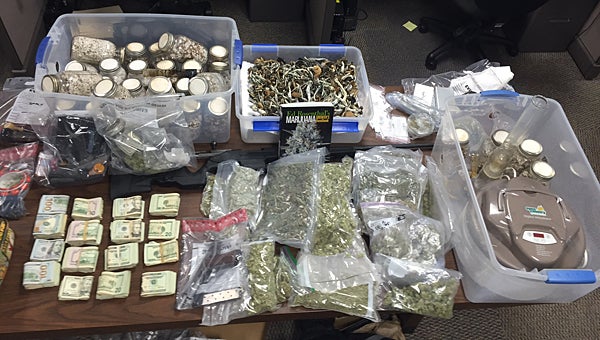Alabaster drug bust leads to 44 pounds of mushrooms
Published 4:20 pm Friday, August 12, 2016

The Shelby County Drug Enforcement Task Force allegedly recovered 44 pounds of psychedelic mushrooms and more than 4 pounds of marijuana at an Alabaster residence on Aug. 11. (Contributed)
By NEAL WAGNER / Managing Editor
ALABASTER – Five suspects are facing felony charges after a Shelby County Drug Enforcement Task Force bust allegedly led to the discovery of 44 pounds of psychedelic mushrooms at an Alabaster residence.
On Aug. 11, Task Force investigators executed a search warrant on a residence in the 200 block of Fran Drive in Alabaster. While at the residence, investigators discovered “an elaborate laboratory used to harvest psychedelic mushrooms and prepare them for sale,” according to Task Force Commander Lt. Clay Hammac.
“During the search of the residence, nearly 44 pounds of psychedelic mushrooms containing psilocybin were seized, along with more than 4 pounds of high-grade marijuana, multiple firearms and more than $25,000 in cash,” Hammac wrote in a release.
Task Force members apprehended five suspects on the scene and charged each with counts of trafficking marijuana, possession of a controlled substance and possession of drug paraphernalia.
Trafficking marijuana is a Class A felony – the highest level in Alabama law – and is punishable by up to life in prison upon conviction.
Apprehended were 31-year-old James Michael Hipp, 36-year-old Behn M. Wartenburg, 22-year-old Thomas William Anderson, 28-year-old Walter Clarence Stewart and 20-year-old Gabrielle Elyce Gunn.
As of Aug. 12, Hipp, Anderson and Stewart were being held in the Shelby County Jail on bonds totaling $516,000, and Wartenburg and Gunn were being held on bonds totaling $266,000.
“We have seen an increase in the possession and use of psychedelic mushrooms among our middle school and high school students,” Hammac said. “I am relieved that this operation has been shut down, and lives have been potentially saved from the possible fatal effects of psilocybin.”
Hammac said Task Force investigators allegedly determined the marijuana seized at the house was purchased from Colorado, California and Oregon.
“Regardless of the popular public opinion of marijuana, it is illegal – plain and simple,” Hammac wrote. “As for the argument of medical value, it’s not relevant in this criminal case. I can confirm that the young adults buying from these armed drug dealers were not attempting to treat an illness; they simply wanted to get high.”













